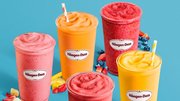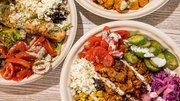Article
Fast casuals focus on food, health
The fast casual segment has built a loyal following through its emphasis on quality and taste.

July 5, 2010 by Valerie Killifer — senior editor, NetWorld Alliance
At the 2010 National Restaurant Association Restaurant, Hotel-Motel, it was standing room only during the panel discussion called Fast Casual Differentiators: Make Your Brand Standout in the New Market Economy. The high level of attendance made it clear that the fast casual category isn’t just a passing phenomenon. And with sales of the Top 100 chains in excess of $17.5 billion in 2009, the segment is leading the industry charge.
We’ve decided to take an in-depth look at what separates the segment from the rest and what truly makes it shine.
In the words of Scott Davis, chief innovation officer for Panera Bread, it's all about the food.
Competitive category
Food has been used to give fast casual operators a competitive edge in today’s restaurant industry. It separated Panera Bread from McDonald's, Chipotle from Taco Bell and Firehouse Subs from the likes of Subway.
Food is also what differentiated the fast casual segment – and turned a small restaurant category segment into a multibillion industry leader.
“Restaurants don’t understand fast casual, but they do understand food,” said Scott Davis, Panera Bread’s chief innovation officer. “The food drives what the concept is all about. Without taste, nothing happens.”
While quick service chains have built their empire around the premise of convenience, fast casuals have elevated the brand experience and have created concepts more reflective of a lifestyle choice rather than a convenience one.
“We think of ourselves as a food first company and that was always like that,” said Au Bon Pain executive chef Thomas John. “All of the changes that have been made (to our menu) have been made only to make food more meaningful to people of today.”
That focus on food has differentiated fast casual concepts from the rest of the restaurant industry – and has placed the segment in the industry’s “sweet spot,” said NRA chief executive Dawn Sweeney.
In 2009, while casual dining chains were filing for bankruptcy, the top 100 chains were posting systemwide sales of $17.9 billion.
Quality and taste
It’s been well documented that over the past 20 years consumer taste preferences have changed. And with them so have the menu items provided by brands such as Panera Bread, la Madeleine, Pizza Fusion and Vapiano, among others.
“You can’t just talk food (to customers),” Davis said. "(Chefs) have to get them excited.”
Fast casual chains have an easier time rolling out new and innovative menu items, and even with QSR chains’ attempts to keep menu rollouts interesting, fast casual concepts are proving those chains are no competition.
“We do focus a lot on ingredients and what goes into a sandwich or a salad or a soup,” John said. “We make sure that it’s healthy and … again that it is food meaningful to people today. Last year alone we did about 60 hours of talking to our customers and from that we understand how people’s lifestyles are changing, if they are, and what makes sense to them.”
Panera Bread’s Davis said part of creating new flavors includes partnerships with suppliers, who can help culinary teams come up with the right combination of ingredients and/or help develop a new food or beverage item.
“For example, if it’s a sauce or dressing, we work with people to come up with the right recipe which we want. It’s all custom … rarely do we get things off the shelf,” John said. “That’s the only way to get the flavor right and to get a product or sauce where we want it to be and what our concept stands for. We try to keep our labels clean and at the end of the day, your end product is as good as what you actually put into it. There’s no easy way other than to focus on each ingredient and each component of the final sandwich or soup, and that’s how we do each and every product.”
In addition to food and beverage innovations, customers also expect fast casual concepts to lead in the implementation of sustainable practices and provide healthy menu options.
For example, Chipotle founder Steve Ells’ focus on serving "Food with Integrity," a motto Ells has promoted since opening his first restaurant in 1993, has made the Fresh-Mex chain, and its founder, a household name.
The motto reflects his early-on decision to change the way Americans view fast food and by serving beef, dairy and produce that are free of added hormones, or are organically grown. Ells also has made the company motto his personal mission.
“For most of these fast casual concepts, the food is really good and they’ve got great menus. Since these restaurants offer restricted service, this gives (operators) one less thing to worry about, so it’s all about the food,” John said. “(Consumers) want to make sure they put the right thing in their body and we want to help them live their life the way they want to. That’s how we look at food innovation.”
 ChatGPT
ChatGPT Grok
Grok Perplexity
Perplexity Claude
Claude












